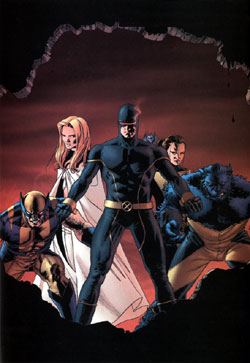Daft Punk
Yesterday, I listened to Daft Punk's album Discovery in a way that I had never really listened to it before. Normally when I play an album, I'm listening to it in the background as I do something else, the better the album, the less complex the activity I'm doing, and I was planning on doing a little drawing when I played Discovery, but 'One More Time' started playing and I just sat on my bed and really heard it, in a way that I had never before. I listened to 'One More Time,' and it just flowed into 'Aerodynamic,' then 'Digital Love,' and for the rest of the album, I just sat there in the dark really hearing the music. It's an absolutely phenomenal album, that I feel like I only got for the first time yesterday.
The brilliance of Daft Punk is in the way they play with the elements of each song. Most music is based around a vocal, and the music exists to support that vocal. This has produced a lot of great music, but that doesn't mean that variety isn't good. What Daft Punk does is construct songs where each element is of equal value.
The most notable thing about this in listening to them is the way they use vocals. Rather than doing extended lyrics, with verses and stuff, they have only a couple of lines in each song. Think of 'One More Time,' there's about four lines in a five minute song. There's some slight variation towards the end, but there's no verse/chorus structure. What 'One More Time' does is blend together a few elements, the staticy guitar part, the bass, the vocals, and use them in different combinations throughout the song. Rather than doing chorus/verse, what Daft do is gradually build up the song, adding elements as time passes, then in the middle remove all the elements except the vocal, and gradually bring everything back. It may seem like it's just some guy saying the same thing over and over again, but that's only if you look at the song from a vocal-centered perspective. There's a ton of variation.
'Digital Love,' my favorite Daft Punk song, and one of my favorite songs period, uses a vocoder to make the voice blend in with the music, and become almost abstracted. There's more lyrics in this song, but it's not really about the lyrics, it's about the way the vocal is blended with the 80s style guitar. At the end of the song, the "Why don't you play the game" part, the vocal and guitar do a call and response, and the guitar has as much melodic weight as the vocal, it's not an echo, it's more like a duet.
Perhaps the best song at abstracting the vocal is 'Harder, Better, Faster, Stronger,' which repeats the title refrain in different contexts to make an incredible song. The vocal becomes basically pure beat, and the variations throughout the song are incredible. On the last song of the album, 'Too Long,' the vocal is reduced to one repeated line, and mixed in with a bunch of other elements, which gradually phase in and out of the song, slowing things down and bringing them back again.
Daft Punk are masters are manipulating the listener, they know just how long to sustain a loop, and exactly when to bring it up again. This is especially apparent on the non-lyric tracks, like 'Verdis Quo,' and 'Superheroes,'which use repeated vocal loops over the course of the entire song.
That's one of the reasons I love Michel Gondry's video for 'Around the World.' It represents each element of the song with a type of creature (robot, skeleton, mummy, etc.) which really allows you to see how they manipulate all the elements of the music. The Spike Jonze Big City Nights video is great, but Gondry's is perhaps the best music video of all time in the sense that it so perfectly visually represents the song.
While they are masters at song construction, ultimately a lot of the greatness comes down to the instrumentation. Discovery uses really distorted 80s style guitars, and it gives it this wonderful disco type atmosphere, that is at once very retro, and almost futuristic. The bubble pop type noises on 'Something About You' are a highlight, as is the entire 'Digitial Love' song, which is impossibly cheesy, yet completley pulls it off. I don't like that song in an ironic way, it's an out and out great song.
Then, today I played Daft Punk's new album Human After All. On the first listen, the title track and 'Robot Rock' were standouts. Human After All is definitely a move back to the more subdued, instrumental work of their first album, Homework. There's no songs with any real lyrics, like 'Digital Love.' There's also less of the 80s style stuff, it's a harder album. I don't think I'll ever like it as much as Discovery, but it's a nice addition to their canon.
Related Posts
More Pop! (2/8/2005)



 King Mob in The Invisibles, as drawn by Phil Jiminez
King Mob in The Invisibles, as drawn by Phil Jiminez This is from Fallen Angels
This is from Fallen Angels The cover of Morrison's Marvel Boy
The cover of Morrison's Marvel Boy City of God
City of God vs.
vs. 


